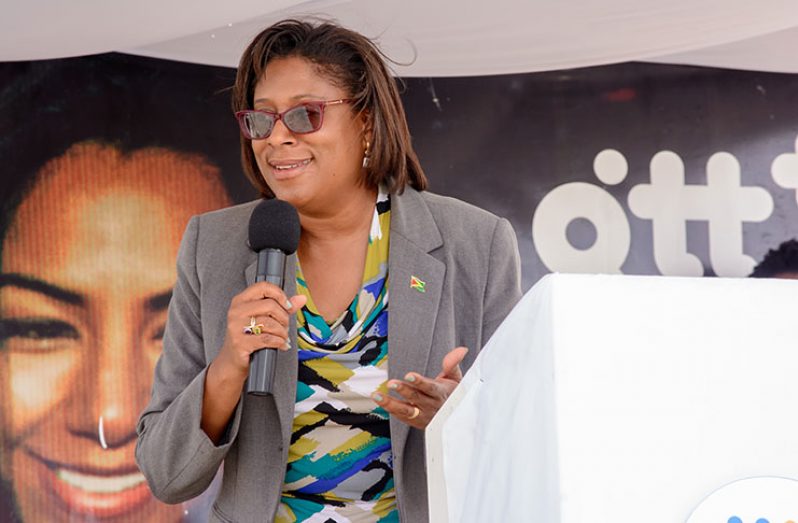…An insight into the work of Minister of Public Telecommunications, Cathy Hughes
By Zena Henry
If it’s one thing that stands out in the cabinet pool of government ministers, it is the charm and persistence of the esteemed Minister of Telecommunications, Catherine Andrea Hughes. Eager to serve in this new capacity after being transferred from the Ministry of Tourism, Hughes said that having to wait on the right people to help roll out her Ministry’s vision was the most frustrating thing since assuming her post.
The Minister, who hails from the Alliance for Change (AFC) arm of the APNU/AFC Coalition Government, said that before her life took a political tone, she operated her own video production company, but following the 2015 general elections, she was called upon by President David Granger to serve as Minister of Tourism and was later asked to lead the telecommunications sector. These changes brought quite a bit of responsibility her way. As the new Minister of Public Telecommunications, she was entrusted with the task of creating a new ministry and organisational structure, establishing goals and objectives for the Ministry as well as the formation of national policy, among other critical tasks. These tasks would see the expansion of telecommunications and the Information and Communications Technology sector (ICT).
“The biggest stumbling block was the slow pace of progress at the Public Service Ministry; the length of time it took to recruit the technical staff I needed to get the job done and the often uncompetitive salary scales vis-a-vis salaries in the private sector, [as well as finding the required] expertise in many unconventional areas,” the Minister disclosed.
Nonetheless, Hughes said that since taking up her post, the ministry has enjoyed some notable achievements, including the passage of the Telecommunications and Public Utilities Commission Bills in 2016, which, she said, will “create a liberalised Telecommunications environment when it comes into force later this year”. She said it will allow more competition in the sector and will also increase service providers while introducing better rates, services and products.
“To date, we have provided free internet access to the computer rooms and administration offices of 101 educational institutions including most high schools, the campuses of the University of Guyana, Cyril Potter Training College, Guyana School of Agriculture and other vocational training institutions. This is done by connecting the institutions to our eGovernment fibre optic network which stretches from Crabwood Creek to Charity on the Essequibo Coast,” Hughes highlighted. She said that her ministry has provided secure and stable internet and broadband internet to most of the ministries that are also connected to the eGovernment network.
Fifty -two ICT hubs have been created in communities to provide a safe and comfortable space for citizens who need to access the internet for education, research and entrepreneurial activities free of charge. A successful “Hackathon” was also hosted to identify a range of ICT professionals and a cadre of young technicians who will guide the development of the industry. “I see my ministry facilitating the creation of an efficient digital government. That means advising, encouraging and guiding other ministries and agencies to perform at a higher level which the use of ICT can provide,” Hughes said.
This includes the way data and information are sorted and stored (a divergence from paper to digital documents) and encouraging Guyanese to use the internet more to apply for their passports, driver’s licenses, business registrations, and other services that could be provided online.”My vision also includes increasing internet access in interior and remote communities so that possibilities for citizens to participate more effectively in education through on-line learning opportunities are increased. In hinterland and rural communities where there are shortages of teachers, online learning can transcend these barriers. The same possibilities exist in the area of health where improved telemedicine opportunities can greatly assist in the provision of quality health services,” Hughes said.
It is the Minister’s hope that by year end, the Telecommunications Ministry will be operating under a new regulatory agency to allocate frequencies and manage spectrum. Indications of interest are also soon expected to come from companies wanting to operate in Guyana’s telecoms market. Improved Telecommunications services and internet access and providing ICT training is also a big ticket for hinterland communities, while moves are being made to link key agencies to provide online services.
Through partnership with the United Nations Development Programme (UNDP), the Ministry of Public Telecommunications has also submitted to the Guyana REDD+ Investment Fund (GRIF) for funding for a transformational project that improves access and entrepreneurial opportunities in hinterland, rural, poor and remote communities. “We are also finalising ‘Smart Guyana’, a project which incorporates increasing internet access for use in education, health, the public sector in the provision of services and a safe city that embodies the use of cameras and technology in relation to security,” the minister highlighted. She said that work also continues on developing a national ICT strategy to entail a five-year strategic development plan to guide the way forward.
Minister Hughes has adjusted well to ministerial life. “I came from a media background, so making speeches at events I am used to doing. The challenge is that you are working almost 18 hours in a day. Even when I go to the market or walk on the road you are informing of government policy, answering concerns and trying to reassure citizens, family and friends who worry, understandably, about a range of issues and how Guyana will move forward,” she said. Personal commitments become a little more difficult, but Hughes said she is grateful for the opportunity given.












